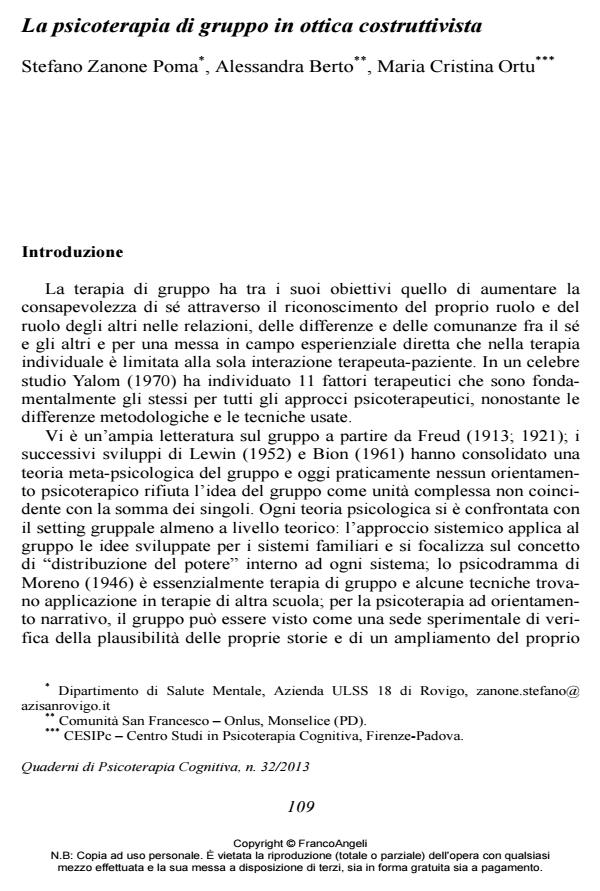La psicoterapia di gruppo in ottica costruttivista
Titolo Rivista QUADERNI DI PSICOTERAPIA COGNITIVA
Autori/Curatori Poma Stefano Zanone, Alessandra Berto, Maria Cristina Ortu
Anno di pubblicazione 2013 Fascicolo 2013/32
Lingua Italiano Numero pagine 13 P. 109-121 Dimensione file 446 KB
DOI 10.3280/QPC2013-032008
Il DOI è il codice a barre della proprietà intellettuale: per saperne di più
clicca qui
Qui sotto puoi vedere in anteprima la prima pagina di questo articolo.
Se questo articolo ti interessa, lo puoi acquistare (e scaricare in formato pdf) seguendo le facili indicazioni per acquistare il download credit. Acquista Download Credits per scaricare questo Articolo in formato PDF

FrancoAngeli è membro della Publishers International Linking Association, Inc (PILA)associazione indipendente e non profit per facilitare (attraverso i servizi tecnologici implementati da CrossRef.org) l’accesso degli studiosi ai contenuti digitali nelle pubblicazioni professionali e scientifiche
La terapia di gruppo è finalizzata al miglioramento della consapevolezza di sé attraverso il riconoscimento del proprio ruolo e di quello degli altri nel contesto di una nuova esperienza relazionale. Gli autori, partendo dai principi fondamentali formulati da George Kelly, analizzano l’applicazione al setting gruppale della psicologia dei costrutti personali e della visuale ermeneutica attraverso l’osservazione della circolarità dei multipli confronti fra i membri del gruppo (e della loro "viabilità"). Vengono inoltre esposti alcuni interessanti protocolli di trattamento. È opinione degli autori che l’approccio costruttivista abbia una certa flessibilità e adattabilità per terapie sia focalizzate su obbiettivi circoscritti che per terapie di durata medio-lunga grazie alla possibilità di applicare diverse tecniche a seconda del sistema di costrutti dei partecipanti e del processo in atto nel gruppo. La psicoterapia di gruppo costruttivista può quindi rappresentare un valido strumento per terapie di gruppo nel contesto istituzionale sia ambulatoriale che comunitario.
Parole chiave:Psicoterapia, gruppo, costruttivismo, ermeneutica
- Kelly G.A. (1955). The psychology of personal construct. Voll. I e II. New York: WW Norton.
- Kelly G.A. (2004). La psicologia dei costrutti personali. Teoria e personalità. Milano: Raffaello Cortina.
- Lewin K. (1952). Field theory in social science: selected theorical papers. New York: Harper and Brothers.
- Linehan M.M. (2001). Trattamento cognitivo-comportamentale del disturbo borderline. Il modello dialettico. Milano: Raffaello Cortina.
- Maturana H. (1993). Autocoscienza e realtà. Milano: Raffaello Cortina.
- Moreno J.L. (1946). Psychodrama. First Volume. New York: Beacon House (trad. it. Manuale di psicodramma. Roma: Astrolabio, 1985).
- Nitsun M. (1996). The Anti-Group. Destructive forces in the group and their creative potential. London: Routledge.
- Piaget J. (1965). Études sociologiques. Genève: Droz (trad. it. Studi sociologici. Milano: Franco Angeli, 1989).
- Slavson S.R. (1962). An introduction to group therapy. New York: The Commonwealth Fund.
- Truneckova D., Viney LL. (2005). Personal Construct Group work with troubled adolescents. In D.A. Winter, L.L. Viney. Personal Construct Psychotherapy: Advances in Theory, Practice and Research. London: Whurr. von Glasersfeld E. (1980). Viability and the concept of selection. American Psychologist. 35: 970-974.
- Yalom I.D. (1970). The theory and practice of group psychotherapy. New York: Basic
- Books (trad. it. Teoria e pratica della psicoterapia di gruppo. Torino: Bollati Boringhieri, 1997).
- Bion W.R. (1961). Experiences in groups. London: Tavistock (trad it. Esperienze nei gruppi. Roma: Armando, 1983).
- Butt T. (2008). George Kelly: the psychology of personal constructs. New York: Palgrave Macmillan (trad. it. George Kelly e la psicologia dei costrutti personali. Milano: Franco Angeli, 2009).
- Chiari G., Nuzzo M.L. (1996). Psychological constructivisms: a meta-theoretical differentiation. Journal of Constructivist Psychology, 9: 163-184. DOI: 10.1080/1072053960840466
- Chiari G., Nuzzo M.L. (2004). Steering personal construct theory toward hermeneutic constructivism.
- In Bridges S.K., Raskin J.D. (eds.), Studies in meaning 2: bridging the personal and social in constructivist psychology. New York: Pace University Press.
- Chiari G., Nuzzo M.L. (2009). Constructivist Psychotherapy: A narrative hermeneutic approach. London: Routledge.
- De Leo G., Dighera B., Gallizoli E. (2005) (a cura di). La narrazione nel lavoro di gruppo. Roma: Carocci Faber.
- Epting F.R. (1990). Psicoterapia dei costrutti personali. Firenze: Psycho, G. Martinelli editore.
- Fassone G. (2004). Overview. Stato dell’arte della psicoterapia di gruppo cognitivocomportamentale nel trattamento dei principali disturbi psichiatrici. Modelli, metodi, efficacia. Cognitivismo Clinico, 1: 85-107.
- Frances M. (2008). Stages of group development – a PCP approach. Personal Construct Theory & Practice, 5: 10-18.
- Freud S. (1913). Totem e Tabù. In S. Freud (2003). Opere, vol. VII. Torino: Bollati Boringhieri.
- Freud S. (1921). Psicologia delle masse e analisi dell’Io. In S. Freud (2000). Opere, vol. IX. Torino: Bollati Boringhieri.
- Gillmann-Smith I., Watson S. (2005). Personal Construct Group Psychotherapy for Borderline Personality Disorder. In D.A. Winter, L.L. Viney (eds.), Personal Construct Psychotherapy: Advances in Theory, Practice and Research. London: Whurr ed.
- Stato dell'arte nella psicoterapia dell'anziano: una pluralità di approcci Laura Carelli, Annalisa Lafronza, Rita Pezzati, Barbara Poletti, Pietra Romano, in QUADERNI DI PSICOTERAPIA COGNITIVA 37/2015 pp.107
DOI: 10.3280/QPC2015-037007
Poma Stefano Zanone, Alessandra Berto, Maria Cristina Ortu, La psicoterapia di gruppo in ottica costruttivista in "QUADERNI DI PSICOTERAPIA COGNITIVA" 32/2013, pp 109-121, DOI: 10.3280/QPC2013-032008